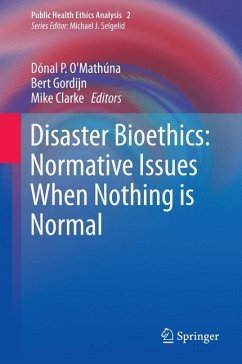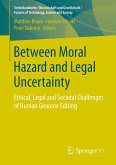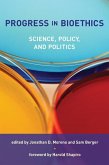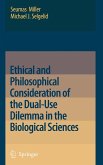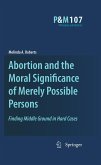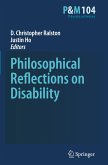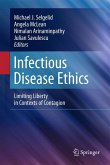This book provides an early exploration of the new field of disaster bioethics:
examining the ethical issues raised by disasters. Healthcare ethics issues are addressed in the first part of this book. Large-scale casualties lead to decisions about who to treat and who to leave behind, cultural challenges, and communication ethics. The second part focuses on disaster research ethics.
With the growing awareness of the need for evidence to guide disaster preparedness and response, more research is being conducted in disasters. Any research involving humans raises ethical questions and requires appropriate regulation and oversight. The authors explore how disaster research can take account of survivors? vulnerability, informed consent, the sudden onset of disasters, and other ethical issues. Both parts examine ethical challenges where seeking to do good, harm can be done. Faced with overwhelming needs and scarce resources, no good solution may be apparent. But choosing the less wrong option can have a high price. In addition, what might seem right at home may not be seen to be right elsewhere. This book provides in-depth and practical reflection on these and other challenging ethical questions arising during disasters.
Scholars and practitioners who gathered at the Brocher Foundation in Geneva, Switzerland in 2011 offer their reflections to promote further dialogue so that those devastated by disasters are respected by being treated in the most ethically soun
d ways possible.
examining the ethical issues raised by disasters. Healthcare ethics issues are addressed in the first part of this book. Large-scale casualties lead to decisions about who to treat and who to leave behind, cultural challenges, and communication ethics. The second part focuses on disaster research ethics.
With the growing awareness of the need for evidence to guide disaster preparedness and response, more research is being conducted in disasters. Any research involving humans raises ethical questions and requires appropriate regulation and oversight. The authors explore how disaster research can take account of survivors? vulnerability, informed consent, the sudden onset of disasters, and other ethical issues. Both parts examine ethical challenges where seeking to do good, harm can be done. Faced with overwhelming needs and scarce resources, no good solution may be apparent. But choosing the less wrong option can have a high price. In addition, what might seem right at home may not be seen to be right elsewhere. This book provides in-depth and practical reflection on these and other challenging ethical questions arising during disasters.
Scholars and practitioners who gathered at the Brocher Foundation in Geneva, Switzerland in 2011 offer their reflections to promote further dialogue so that those devastated by disasters are respected by being treated in the most ethically soun
d ways possible.
"The book is comprised of 13 chapters ... contributed by individual authors and divided into two sections. ... It will serve to shape and focus future research and debate. ... This is a volume that will be of value to those interested in exploring the acceptable ethical bounds of conduct during times of disaster. Such individuals should include not only ethicists but also public health professionals, humanitarian aid workers, and academics who might conduct research in a disaster setting." (James D. Hearn, Bioethical Inquiry, Vol. 12, 2015)
"This edited volume brings together an interdisciplinary array of scholars from around the world to discuss disaster bioethics. ... book offers an insightful examination of some neglected topics within the larger study of disasters that warrant inquiry. ... Disaster Bioethics is a much needed contribution to a field that struggles with how to carry out research in extreme situations. It should be read, at the very least, by any scholar or practitioner who wishes to conduct fieldwork in disaster research." (Nathalie Baker, Natural Hazards Observer, Vol. 39 (6), July, 2015)
"The book is comprised of 13 chapters ... contributed by individual authors and divided into two sections. ... It will serve to shape and focus future research and debate. ... This is a volume that will be of value to those interested in exploring the acceptable ethical bounds of conduct during times of disaster. Such individuals should include not only ethicists but also public health professionals, humanitarian aid workers, and academics who might conduct research in a disaster setting." (James D. Hearn, Bioethical Inquiry, Vol. 12, 2015)
"The book is comprised of 13 chapters ... contributed by individual authors and divided into two sections. ... It will serve to shape and focus future research and debate. ... This is a volume that will be of value to those interested in exploring the acceptable ethical bounds of conduct during times of disaster. Such individuals should include not only ethicists but also public health professionals, humanitarian aid workers, and academics who might conduct research in a disaster setting." (James D. Hearn, Bioethical Inquiry, Vol. 12, 2015)

